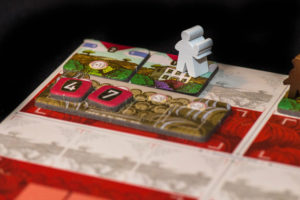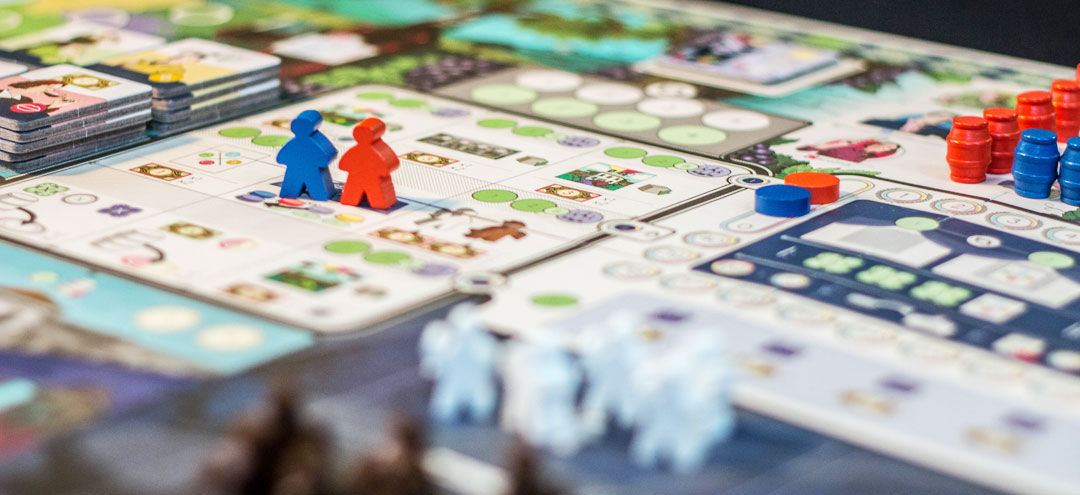 Vinhos: Deluxe Edition is a reprint of the original Vinhos, released in 2010. However, not only is the original version of the game in the box, but also an updated version of the game with a streamlined ruleset. Vinhos was designed by Vital Lacerda, who has also designed Kanban, The Gallerist, and most recently, Lisboa.
Vinhos: Deluxe Edition is a reprint of the original Vinhos, released in 2010. However, not only is the original version of the game in the box, but also an updated version of the game with a streamlined ruleset. Vinhos was designed by Vital Lacerda, who has also designed Kanban, The Gallerist, and most recently, Lisboa.
Vinhos is a worker placement/action selection game for 1-4 players. It plays well with all player counts and plays in about two hours.
Gameplay Overview:
In Vinhos, each player takes the role of a wine producer in Portugal. You can develop multiple estates to create and promote a variety of wines. Similar to other Vital Lacerda designs, it is a take on worker placement where you have only one worker. This worker moves around a grid of 9 possible actions. The game takes place over 6 years and you are able to take two actions each year. You must make the most out of the 12 actions you get throughout the game.
During setup you will choose one vineyard and will start with a pretty terrible wine already produced in your estate. From there you can improve your wine by building wineries, hiring enologists and farmers, or building cellars. As wine in cellars age they become increasingly valuable. You can also start up additional estates with vineyards in other regions throughout Portugal, each which provides its own small ability.

After years 3, 5, and 6 there is a wine fair. The wine fairs are the opportunity you have to display your wines to the public and to the very important wine magnates. Whoever submits the best wine at the fair will receive the most victory points, but impressing magnates will give you the ability to claim magnate tiles that provide additional actions or additional end game scoring opportunities.
Another action that is available to you is to recruit wine experts. The wine expert tiles each have an action that can be used as a “free” action on your turn. Alternatively, you can choose not to use the expert and instead have them provide influence during the wine fair to help improve your standing there. If you use an expert for their action, they become available again after each fair, allowing you to potentially use them three times throughout the game.
In addition to submitting wines to the fair, you can sell your wines to the local establishments or export it overseas. Selling locally will give you in influx of cash which can be helpful for continuing to expand your estates. Exporting allows you to claim spaces based on the quality of wine you send, scoring immediate victory points and additional points at the end of the game for having exported the most to each region.
The 2010 version of the rules adds a banking action. Money you make goes to the bank and you must take an action to withdraw your cash. You can also make investments to increase earnings throughout the game. You must also spend an action before each wine fair to issue a press release to be able to impress the wine magnates. While you can take this action in the 2016 version, you don’t have to and you’ll still be able to submit a wine.
At the end of the game you total points from wine fairs, export actions, and additional scoring opportunities earned from the wine magnates. Whoever has the most points is the most successful wine entrepreneur in all of Portugal.

Game Experience:
To start, this deluxe version of Vinhos is beautifully produced. Like other Lacerda games from Eagle-Gryphon Games, Vinhos includes beautiful artwork from Ian O’Toole and great wooden components. There are wonderful player aids that include information for both the 2016 and 2010 version of the rules as well as separate rulebooks for each. It looks great on the table. It will take a while to set up, especially for your first few plays. The number of most of the components used changes with number of players so you have to be careful to set out the right pieces each time.
When it comes to the gameplay itself, I love the number of ways you can approach trying to score points. You have a very limited number of actions available to you; only 12 actions throughout the game. Getting magnate tiles and wine experts can be vital to provide you those additional “free” actions.

Then you must decide how many estates you really want to try to start up. Each estate will only produce one wine each year, so having many can certainly be helpful. However you will be foregoing the opportunity to improve your existing estates. So while you may have more wine, it will be more like the Trader Joe’s variety than something worth keeping in the cellar. And once you have wine, you must decide if it is best to export it, sell it locally, or to save the best wines for the wine fair.
Each strategy has its own merits. There are vintage tiles revealed each round that modify the quality of the wine you produce each turn. If you try to churn out a lot of low quality wine, it is possible the bad weather could cause your estates to not actually produce any useable wine. These vintage tiles also reveal what the wine magnates are hoping to try this year. These random vintage elements are my least favorite part of the game as you often just have to cross your fingers and hope you’ll be able to meet the demands of a couple of the magnates before the wine fair.
Winning wine fairs can net you a lot of points but so does exporting high value wines. The magnate tiles that you can earn that give additional scoring opportunities can really drive what approach you take. The end of the game can sneak up on you pretty quickly. The low number of actions means you will almost undoubtedly feel like the game ended just as you started to get things off the ground. Maximizing efficiency is the name of the game here.

When it comes to 2010 versus 2016 ruleset, they provide slightly different experiences. The 2016 version is somewhat lighter. You don’t have to use your actions to get money or to issue a press release to take advantage of the magnate actions. It becomes more of a tactical experience as it is fairly easy to adjust plans if someone gets in your way. The end game multipliers aren’t revealed until after the first wine fair and more are revealed after the 2nd fair. Don’t take that the wrong way, Vinhos is still a deep and heavy game regardless of the vintage you choose to play but it does seem a little stripped down.
I prefer the 2010 edition. For me, the ability to know exactly which scoring multipliers are available and being able to claim them as soon as possible makes for a better strategic experience. If you plan well and impress the right magnates and work turn order to your advantage, you can insure you can claim the spaces you want. Of course that comes at the expense of being able to take additional magnate actions throughout the game. Vinhos 2010 is much tighter experience as not only do you have to use actions to get money from the bank, you also have to issue a press release before the fair or you won’t earn any of the magnate benefits. It is also more punishing as you have to plan a bit farther ahead and a mistake can set you back pretty far.
Final Thoughts:

Vinhos is yet another wonderfully designed game from Vital Lacerda; it’s paired with a wonderful production from Eagle-Gryphon. There isn’t a lot to complain about here. Both the 2010 and 2016 versions are both great games. While I prefer the 2010, I would happily play either almost any time. In fact, the 2016 version may be a good gateway for many gamers from medium weight games into things a little bit heavier.
Vinhos does a fantastic job of incorporating the theme into the mechanics. It is intuitive that vineyards make wine, wineries make them better, and cellars help them age longer and improve their quality. It also makes sense that weather can impact the quality of your product, as frustrating as that may be. Vital is a master at making heavy euros that feel thematic and Vinhos is certainly no different.
It actually plays fairly quickly, clocking in at about two hours. It feels pretty snappy and isn’t the type of game that wouldn’t necessarily take your entire game night. If you aren’t a fan of deep strategic multi-hour games, Vinhos isn’t going to change your mind. You have to concentrate and really invest a lot of brainpower in planning your game. If that is a thing you enjoy doing in board games, you will enjoy Vinhos.
Final Score: 4.5 Stars – Fantastic euro game with lots of theme. It has lots of tough but rewarding decisions to make.
 Hits:
Hits:
• Theme and mechanics fit perfectly together
• Lots of routes to victory and no clear best options
• Beautifully produced game
Misses:
• Random vintage tiles can be frustrating
• Setup can be quite long






















